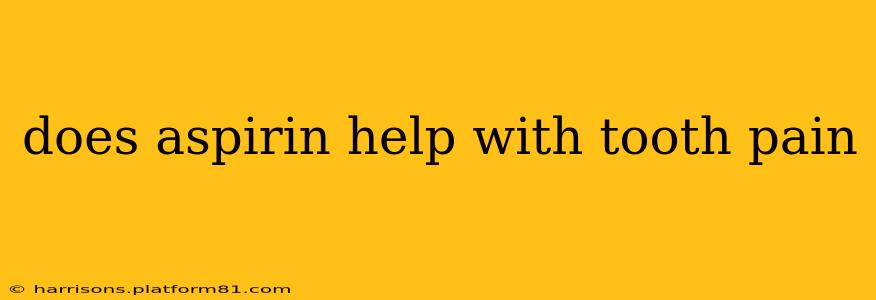Tooth pain is a common ailment, often striking unexpectedly and causing significant discomfort. While a trip to the dentist is crucial for addressing the underlying cause, many people seek immediate relief with over-the-counter pain relievers. One frequently considered option is aspirin. But does aspirin actually help with tooth pain, and if so, how effectively? This guide will explore the effectiveness of aspirin for toothaches, its limitations, and safer alternatives.
Is Aspirin Effective for Toothaches?
Aspirin, or acetylsalicylic acid, is a nonsteroidal anti-inflammatory drug (NSAID) known for its analgesic (pain-relieving) and anti-inflammatory properties. While it can temporarily reduce the pain associated with a toothache, it's crucial to understand its limitations. Aspirin primarily targets inflammation and pain signals, not the underlying dental issue itself. It may offer temporary relief from mild to moderate tooth pain, but it won't fix the problem causing the pain.
How Does Aspirin Work to Relieve Tooth Pain?
Aspirin works by inhibiting the production of prostaglandins, substances in the body that trigger pain and inflammation. By reducing prostaglandin levels, aspirin decreases pain sensation and swelling in the affected area. However, its effectiveness is limited to the pain signals themselves and doesn't address the root cause of the toothache, such as an abscess, cavity, or gum disease.
When Should You NOT Use Aspirin for Tooth Pain?
While aspirin can provide temporary relief, it's not always the best choice for tooth pain. Here are some situations where you should avoid using aspirin:
- Severe Tooth Pain: For intense or unbearable pain, aspirin may not be sufficient. Stronger pain relievers, such as ibuprofen or naproxen, might be more effective. In severe cases, immediate dental attention is essential.
- Allergic Reactions: Some individuals are allergic to aspirin, and using it can lead to serious allergic reactions.
- Bleeding: Aspirin thins the blood and can increase bleeding risk, especially if you have bleeding gums or an oral injury.
- Children and Teenagers: Aspirin should not be given to children or teenagers due to the risk of Reye's syndrome, a rare but serious condition.
- Underlying Medical Conditions: People with certain medical conditions, such as peptic ulcers, bleeding disorders, or liver or kidney disease, should consult a doctor before taking aspirin.
What Are Better Alternatives for Toothache Pain Relief?
For tooth pain, a dentist's visit is the best solution. However, while awaiting an appointment, consider these alternatives:
- Ibuprofen (Advil, Motrin): Ibuprofen is another NSAID that is generally considered safer than aspirin for toothache relief and is often more effective.
- Acetaminophen (Tylenol): Acetaminophen is a pain reliever that doesn't have anti-inflammatory properties but can still effectively reduce mild to moderate tooth pain.
- Over-the-counter dental gels or creams: These products can provide topical relief by numbing the affected area.
- Saltwater rinse: Rinsing your mouth with warm salt water can help clean the area and reduce inflammation.
Can Aspirin Help with a Tooth Abscess?
No, aspirin will not cure or effectively treat a tooth abscess. A tooth abscess is a serious infection requiring immediate dental attention. While aspirin might temporarily reduce the pain associated with an abscess, it won't address the infection itself. Ignoring a tooth abscess can lead to severe complications, so seeking professional dental care is crucial.
How Long Does Aspirin Take to Relieve Tooth Pain?
The onset of pain relief with aspirin varies depending on the individual and the severity of the pain. Generally, you can expect to feel some relief within 30 to 60 minutes after taking the recommended dose.
What Should I Do if My Tooth Pain Doesn't Improve?
If your tooth pain persists or worsens despite taking aspirin or other over-the-counter pain relievers, schedule an appointment with your dentist immediately. Delayed treatment can lead to more severe dental problems and complications. Tooth pain is a sign that something is wrong, and professional dental care is essential for diagnosis and treatment.
This information is for general knowledge and does not constitute medical advice. Always consult a dentist or other qualified healthcare professional for any questions you may have regarding a medical condition. Self-treating can be dangerous, and professional advice is always recommended.
